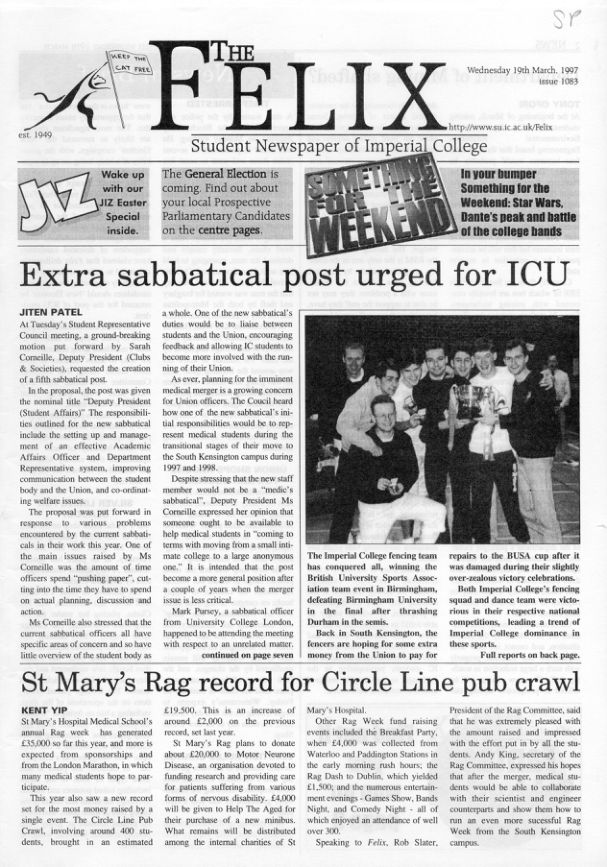Extra sabbatical post urged for ICU
At Tuesday’s Student Representative Council meeting, a ground-breaking motion put forward by Sarah Corneille, Deputy President (Clubs & Societies), requested the creation of a fifth sabbatical post.
In the proposal, the post was given the nominal title "Deputy President (Student Affairs)" The responsibilities outlined for the new sabbatical include the setting up and management of an effective Academic Affairs Officer and Department Representative system, improving communication between the student body and the Union, and co-ordinating welfare issues.
The proposal was put forward in response to various problems encountered by the current sabbaticals in their work this year. One of the main issues raised by Ms Corneille was the amount of time officers spend "pushing paper", cutting into the time they have to spend on actual planning, discussion and action.
Ms Corneille also stressed that the current sabbatical officers all have specific areas of concern and so have little overview of the student body as a whole. One of the new sabbatical’s duties would be to liaise between students and the Union, encouraging feedback and allowing IC students to become more involved with the running of their Union.
As ever, planning for the imminent medical merger is a growing concern for Union officers. The Coucil heard how one of the new sabbatical’s initial responsibilities would be to represent medical students during the transitional stages of their move to the South Kensington campus during 1997 and 1998.
Despite stressing that the new staff member would not be a "medic’s sabbatical", Deputy President Ms Corneille expressed her opinion that someone ought to be available to help medical students in "coming to terms with moving from a small intimate college to a large anonymous one." It is intended that the post become a more general position after a couple of years when the merger issue is less critical.
Mark Pursey, a sabbatical officer from University College London, happened to be attending the meeting with respect to an unrelated matter. Alex Feakes, another of ICU’s four sabbaticals, questioned Mr Pursey as "expert witness" on the usefulness of the proposal since UCL’s Students’ Union has, at present, five sabbaticals.
Mr Pursey explained that UCL students had recently discussed the possibility of moving from five to six sabbaticals for similar reasons, but had come to the conclusion that it wasn’t another sabbatical they needed but more union staff at an administrative level. Such permanent staff should filter out day-to-day matters and paperwork, thus reducing the sabbaticals workload and leaving them the time to concentrate on policy issues.
This system is currently being introduced at UCLSU and has proven effective. ICU Council recognised the value of permanent staff and agreed that this would have to be a long term project. Ms Corneille added that she has already reorganised the Union Office’s staff, so that next year’s Deputy President would have a ‘clubs and societies administrator’ to help her.
After some discussion, Council voted in favour of the proposal to create a new post but agreed that much planning is needed before implementation. ICU must also take steps to secure funding for any new members of staff. Any change in the number of ICU sabbaticals must be approved by the Governing Body





